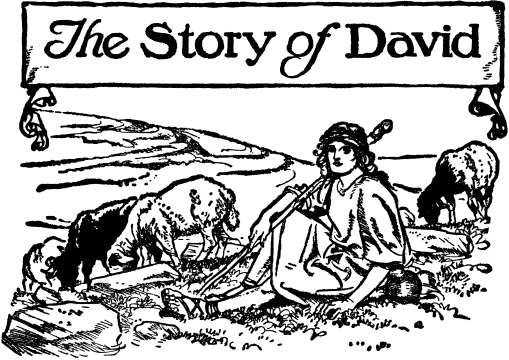[folio 3]
DAVID THE
SHEPHERD BOY
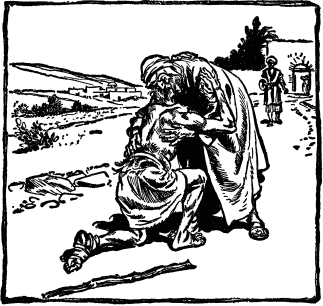
THOMAS NELSON & SONS
NEW YORK
[folio 4]
BOOKS IN THIS SERIES
- JOSEPH THE DREAMER
- THE BABE IN THE BULRUSHES
- DAVID THE SHEPHERD BOY
- THE CHILD JESUS
- THE GOOD PHYSICIAN
- THE GOOD SHEPHERD
PRINTED IN THE UNITED STATES OF AMERICA
Up amongst the hills, perched like the nest of a bird on one of the long low ridges, lies the little town of Bethlehem. It was but a small town at the time this story begins, and there was nothing about it to make it at all famous. It lay out of the beaten track, and any one wanting to visit it must needs climb the long winding road that led from the plain beneath, through olive groves and sheepfields, up to the city gate—a steep, difficult road, leading nowhere but to the little town itself.
It was in these fields on the slope of the hills that David, the shepherd boy of Bethlehem, spent his days watching his father’s flocks. That father, whose name [folio 6] was Jesse, was one of the chief men of the town, and David was the youngest of all his sons.
There were seven big brothers at home, and it was no wonder Jesse was proud of his sons. They were tall, splendid young men, all of them doing men’s work now, and taking very little notice of the youngest, who was still only a small boy, chiefly useful in looking after the sheep.
But though David was but little thought of, no one could say that he did not do his work well. There was not a more careful or watchful shepherd on all the hills around Bethlehem. He knew each one of his sheep, and never allowed one to stray. He always led them to the best pasture, and found the coolest and freshest water for them to drink. Then, too, he was as brave as a lion, and if any wild beast came lurking round hoping to snatch a lamb away, David was up at once and would attack the fiercest beast single-handed. Nothing could ever do any harm to his flock.
Now it happened that one day while David was, as usual, out in the fields that a sudden stir of excitement awoke in the little town of Bethlehem. Men gathered round the city gate, and with anxious, fearful eyes looked down the long white road that led up from the plain below. And yet there seemed nothing there to make them look so terrified and anxious. Only an old feeble man was slowly climbing up towards the town. He was driving a heifer before him, and carrying what looked like a horn in his hand.
[folio 7]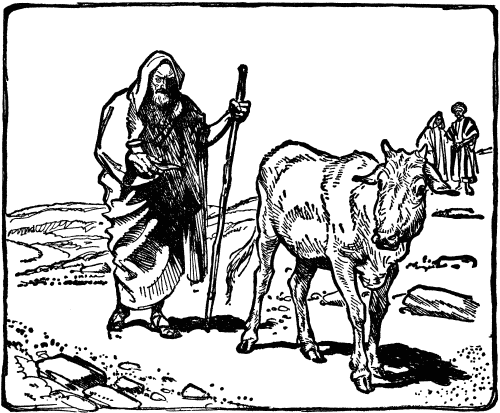
An old feeble man was slowly climbing up towards the town.
But the people whispered together that the old man was none other than Samuel, the prophet of the Lord, who carried God’s messages. He must be bringing a message to them, and who knew if it was good or evil. They tried with uneasy minds to remember if they had been doing anything wrong of late as they watched the old man drawing nearer and nearer. Then at last the chief men of the town went out to meet him.
“Comest thou peaceably?” they asked anxiously.
The old man lifted his head and looked at them kindly as he echoed their words.
[folio 8]
“Peaceably,” he answered at once; “I am come to
sacrifice unto the Lord.”
A great sigh of relief went up from the people. The visit was a mark of God’s favour and not of His displeasure.
It was true, indeed, that Samuel had come to offer sacrifice, but he had come also on a secret errand about which no man knew but himself. God had bidden him take his horn of oil and anoint one of the sons of Jesse to be king over His people instead of Saul, the present king, who had displeased Him. But it was to be done secretly. Saul must not hear of it, or his vengeance would be swift.
It was in Jesse’s house that the feast of the sacrifice was prepared, and Samuel ordered that all the sons of the house should pass before him as they went to attend the sacrifice.
The first to come was Eliab, Jesse’s eldest son, and when Samuel saw him he felt sure that this was the man who was to be anointed king. He was a splendid young man, tall and strong and handsome, looking almost as kingly as Saul himself.
“Surely this is he,” murmured Samuel to himself. But God’s answer came quickly. No, this was not the man. Samuel saw only the outward signs of strength and beauty, but God saw deeper into the heart.
So the eldest son passed on, and one by one the six brothers followed, all sons that a father might well be [folio 9] proud of. But God sent no sign to show that any of them was the chosen king.

“Surely this is he,” murmured Samuel to himself.
Samuel was puzzled. What could it mean? Then he turned again to Jesse.
“Are here all thy children?” he asked.
Surprised at the question, Jesse suddenly remembered [folio 10] the little lad, his youngest son, who was out in the fields tending the sheep. Was it possible that Samuel had any use for him?
“Send and fetch him,” ordered Samuel instantly, “for we will not sit down till he comes hither.”
So a messenger was sent in haste to bring David; and presently he came hurrying in, and as soon as Samuel saw him he knew his search was ended.
He was only a little shepherd lad with the breath of the hills about him, his golden hair tossed by the wind, his fair face flushed, and his sunburned hand holding his shepherd’s crook. But there was no doubt that God had chosen him.
“Arise and anoint him, for this is he,” said God’s voice in Samuel’s heart.
Slowly, then, the old man rose and held the oil aloft and poured it upon the boy’s bowed head, while the rest of the company looked silently on.
They were puzzled to know what it all meant. Perhaps the elder brothers were envious, and wondered why this mere child should be singled out for special favour. But no one dared to question God’s messenger.
Nothing further happened just then. Samuel returned as he had come by the winding white road, and before long his visit was forgotten as the people settled to their work again.
[folio 11]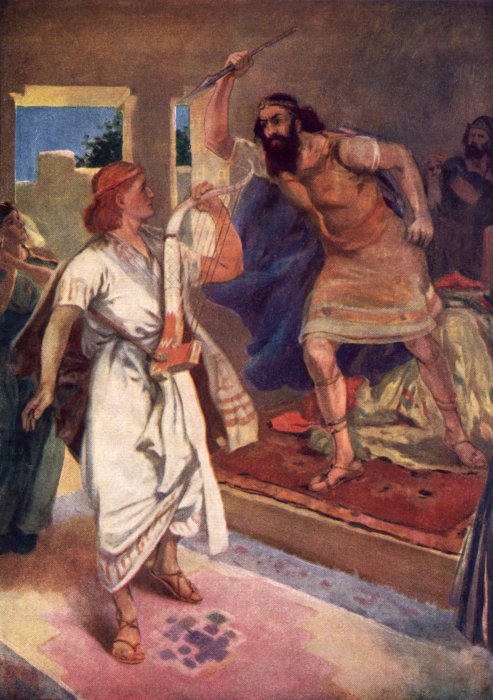
Saul tries to kill David
Only David, out in the fields, thought more and more about what had happened, and grew more and [folio 13] more certain that it had been a call from God to do some special work for Him. The wonder of it filled his mind, but it never interfered with his work.
There was little time for idle dreaming in the boy’s life. He was as watchful as ever in his care for his sheep and as courageous as ever in guarding them from prowling beasts. Even in his leisure time he was busy too, and there was not one of the sunny hours of daylight that he wasted.
He loved music, and he taught himself to play on the harp, practising so carefully and patiently that his [folio 14] fingers grew most wonderfully skilful. Then he made songs to go to the music, some of the most beautiful songs that ever have been made in all the world. Almost every child to-day knows his beautiful song about the Good Shepherd: “The Lord is my shepherd, I shall not want.”
There was another thing, too, that he learned to do with the same care and patient perseverance, and that was to use his shepherd’s sling. There was no boy in all Bethlehem who could shoot as straight as he could. He never missed his mark.
It was no great thing, perhaps, to make music and aim straight, but it was a great thing to do what lay nearest his hand with all his might. Perhaps some day God would make use of his singing or have some work for a boy who had a quick eye and a sure aim. Who could tell?
So David learned to do his very best, and before very long God’s call came to him.
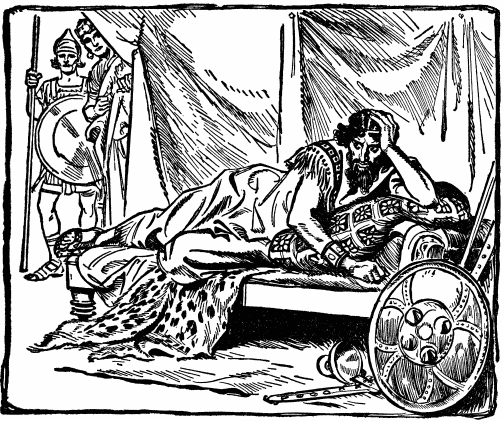
Saul sat day after day in his darkened tent.
Saul, the King of Israel, sat day after day in his darkened tent ill and full of misery. No one dared to go near him, and his servants whispered together, “It is an evil spirit from the Lord that troubles him.”
Then some one suggested that perhaps music might help to cheer him and drive the evil spirit from him.
“Let our lord now command thy servants to seek out a man who is a cunning player on a harp,” they said to the king, “and it shall come to pass that, when the [folio 15] evil spirit from God is upon thee, he shall play with his hand, and thou shalt be well.”
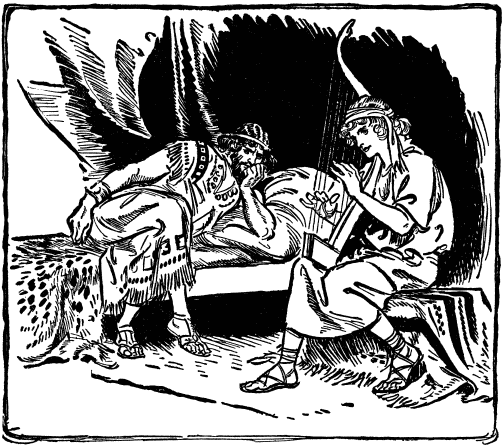
David drew magic music from his harp’s strings.
Saul listened to their words, and hope crept into his heart.
“Provide me now a man that can play well, and bring him unto me,” he said eagerly.
Now the fame of David’s playing and singing had spread even beyond Bethlehem. “We must send for David, the son of Jesse,” said the king’s servants at once. He was the very person they wanted. Not [folio 16] only could he sing and play, but he was a good boy, brave and fearless, and best of all, as the servants said, “The Lord is with him.”
So the shepherd boy was brought to the king’s darkened tent, ready to do his bidding. Sitting there in the dim light, he drew such magic music from his harp’s strings, and sang such sweet songs, that the very song of the birds seemed to be filling the tent. The king, as he listened, seemed to feel the breath of the mountain fields, to hear the call of the sheepfold and the murmur of the dancing streams. It acted like a charm. The black misery was lifted from his heart, and the evil spirit was put to flight by the song of the shepherd boy.
It was no wonder, then, that the king, for a time at least, loved the boy with his bright face and sunny hair, and wanted to keep him as his armour-bearer. But perhaps, as Saul grew well and had no further need of the music, David was no longer wanted, and so he went back again to the Bethlehem fields to look after his sheep.
God had made use of David’s skill in music, and before very long another call came to him. This time the need was for one who could aim straight, who had a quick eye and a steady hand.
War had broken out. The fierce Philistines had come up with their great armies to try and conquer the land. Every man in Israel who could fight was called [folio 17] up to protect his country. Already David’s three elder brothers had joined Saul’s army, which was preparing to fight the enemy.
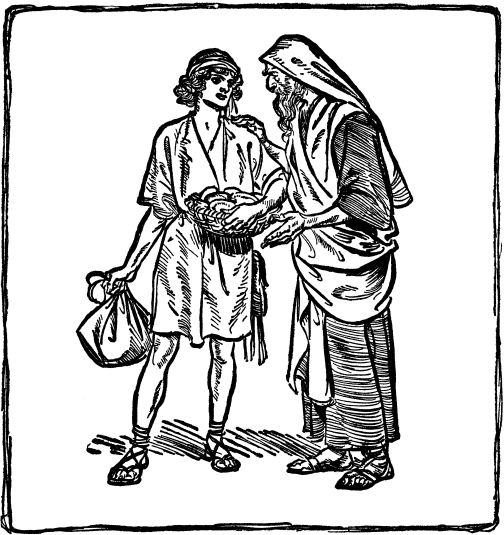
Jesse sends David to the camp.
On either side of a narrow valley, divided by a stream which ran along over smooth stones, the two armies faced each other. There they were encamped, [folio 18] like wild beasts ready to fly at each other’s throats. At any moment the fight might begin, and that stream be stained red with blood. Only the Philistines were far the strongest, and the Israelites had but little chance of victory.
This valley was seven or eight miles distant from the little town of Bethlehem, and Jesse waited anxiously, day after day, for news of his three sons. At last he could bear the anxiety no longer, and he determined to send David to the camp to carry food to his brothers and bring back news how they fared.
So, very early one morning, David set out on his errand. He had carefully put his sheep under the care of another shepherd, and he took with him parched corn and loaves of bread for his brothers, as well as ten cheeses which his father was sending to the officers under whom they served.
It was not long before the boy came within sight of the valley, and his heart began to beat with excitement, for he saw that he had arrived just as something was about to happen. The armies were drawn up in battle array, and suddenly a great shout went up from both sides. It was the battle-cry of the two armies which sounded in his ears.
There was no time now to carry food and gifts, so David quickly left his load at the entrance to the camp and hurried on to search for his brothers. He had learned to find his way about a camp, where for a short [folio 19] time he had been Saul’s armour-bearer. So now he went swiftly among the soldiers, until at last he found his brothers. “Were they well?” he eagerly asked them; “and what were they doing?”
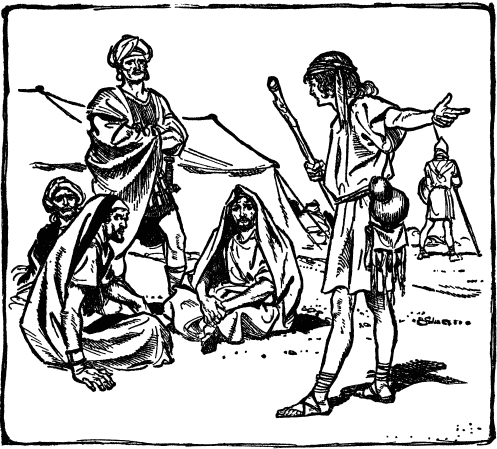
Eagerly David began to ask them what it meant.
But even while he spoke there was a stir among the Philistines, and all eyes were turned to watch, all ears were strained to hear the enemy’s challenge, which rang out clearly across the narrow valley.
Out of the rank of the Philistines there had stepped a man so tall and strong that he appeared to be a giant. [folio 20] He was more than nine feet high, and the armour which he wore was so solid and heavy that it would have crushed any ordinary man to the earth.
This was Goliath, the great champion of the Philistines. Every morning and every evening he strode proudly out and defied the Israelites, bidding them find a champion who would come and fight with him. Once again his challenge rang out on the clear air,—
“Choose you a man for you, and let him come down to me. If he be able to fight with me and to kill me, then will we be your servants; but if I prevail against him and kill him, then shall ye be our servants and serve us. I defy the armies of Israel this day. Give me a man that we may fight together.”
A great silence fell after the champion had shouted his last words of defiance. There was no answer from the Israelites. No man had courage enough to dream of accepting the challenge.
David looked round him in amazement, and his cheeks burned with shame. What were the people doing to allow this boasting heathen Philistine to defy the armies of the living God? Eagerly he turned to the men around him and began to ask them what it meant. The soldiers answered him shortly. No, there was no one who dared to go forth and fight Goliath. The king had promised great rewards to any man who would kill the giant. But no one had dared to try.
David’s elder brothers heard his questions, and seeing [folio 21] how amazed he was, they began to grow angry. Did he mean to reproach them? Perhaps he thought of offering himself to fight the champion. It was time that this shepherd boy should be put in his proper place. So his eldest brother turned to him with a sneer.

While he kept his father’s sheep he had often to defend
them from wild beasts.
“Why camest thou hither?” he asked. “And with whom hast thou left those few sheep in the wilderness? I know thy pride and the naughtiness of thy heart, for thou hast come down that thou mightest see the battle.”
It could not have been very easy to bear this taunt. [folio 22] But David had learned to conquer himself before he set out to conquer giants. So he answered quietly instead of flashing back an angry reply.
“What have I done?” he asked. “May I not ask a harmless question?”
There were many questions he still wished to ask, and presently the soldiers began to repeat his words one to another, until at last the report was spread that some one had been found ready and willing to answer the challenge of the giant Philistine. And of course the news soon reached the king’s ear. Saul sent immediately and ordered that the shepherd lad should be brought to him. He had quite forgotten about the boy who had charmed away his black moods with the magic music of his harp. And David had grown and changed since those days.
So now, when David stood before the king, Saul had no idea who he was, and his one thought, as he looked at the slender youth, was that it was madness to think of such a mere boy going out to give battle to the great giant.
“Thou art not able to go against this Philistine,” he said; “for thou art but a youth, and he a man of war from his youth.”
But David answered eagerly. He did not boast, but spoke steadily and wisely. True, he had not been trained as a soldier, but his courage and his strength had both been already proved. And he went on to [folio 23] tell the king that while he kept his father’s sheep he had often to defend them from wild beasts. Once he had fought with a lion and a bear single-handed and had killed them both.
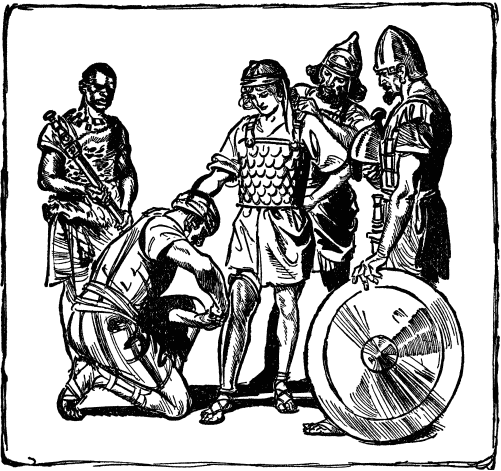
Saul puts his own armour on David.
It was not in his own strength that he trusted. “The Lord that delivered me out of the paw of the lion and out of the paw of the bear, He will deliver me out of the hand of this Philistine,” he ended triumphantly.
[folio 24]
Faith in God was David’s sure defence; and Saul as
he listened bowed his head in shame, for it was the faith
which he himself had lost. It was this faith, he knew,
which might win the victory. It was an echo of the
confidence he had once felt when his whole trust had
been in God, and he recognized the true ring of the
boy’s courage.
“Go,” he said, “and the Lord be with thee.”
Then the king was eager to put his own armour on David, and he bade the soldiers arm him with the royal sword and put a brass helmet on his head. But David was not accustomed to wear heavy armour, and had never been trained to use a sword. No, he would do his best with the only weapon he thoroughly understood.
So putting on once more his shepherd’s coat, he took his sling in his hand, and as he crossed the brook at the foot of the valley he filled his shepherd’s bag with smooth stones and fitted one of them to his sling. Then with springing steps he began to climb the opposite side.
The rage of Goliath was great when he saw the slender, fair-haired boy, without either armour or sword, coming so boldly to meet him.
“Am I a dog,” he shouted, “that thou comest to me with staves?”
[folio 25]
David’s fight with Goliath.
“I come to thee in the name of the Lord of Hosts, the God of the armies of Israel, whom thou hast defied,” rang out the clear answer. “The Lord saveth not with [folio 27] sword and spear; for the battle is the Lord’s, and He will give you into our hands.”
The great giant lifted his spear, ready with one blow to end this unequal fight. But David did not wait to come within reach of the spear. Before Goliath came near, the boy stopped suddenly and sent a stone whizzing through the air straight at the giant’s head. The stone sank into Goliath’s forehead, and the great figure reeled and fell with a mighty crash to the earth. Instantly David seized his sword and cut off his head.
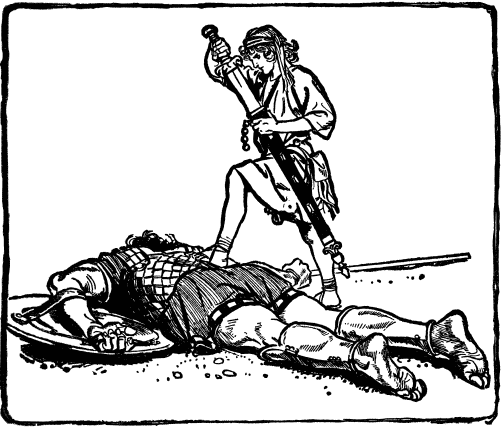
David seized his sword and cut off his head.
So God’s people were saved, and so again God made [folio 28] use of the shepherd boy’s training and skill, this time to win a great victory for His people.
The fair-haired shepherd boy had done his duty faithfully in the fields on the hillside at home, where he was but little thought of. He had always tried to do his best, whether he was keeping the sheep or practising with his sling or learning to play the harp. And now, suddenly, the great opportunity had come and found him ready.
He had entered the camp an unnoticed country lad, carrying provisions to his brothers. Now every soldier in the camp was shouting his name; the king was ready to shower rewards and honors upon him. He was the hero of the hour.
The pleasant days in the Bethlehem fields were now over for David. There was no thought of allowing him to return to his work. No, the king declared he must remain as a soldier in the army, ready to defend his king and country. Though he was still a mere boy he was placed in command and set over the men of war.
It was much more difficult work than looking after sheep, and as time went on and dangers and difficulties beset him on every side, David must often have longed for the old quiet days on the hillside. His path was rough and dangerous now, and sad to say his feet often slipped and he wandered far astray, but always he held fast to his faith in God, and found his way back to the straight path.
[folio 29]
As the years went by Samuel’s promise was at last
fulfilled, and David was made king over God’s chosen
people. David had often forgotten God, but God had
never forgotten him.
What a change it was from the days when he wandered about the fields in his sheepskin coat, often sleeping out under the stars, possessing only his harp and his shepherd’s sling.
Now he wore royal robes, and there was a crown of pure gold upon his head. Instead of the starry sky for a roof, he now lived in a palace of cedar wood.
And he knew surely that it was God who had taken care of him; that it was God who had set the crown of gold upon his head, the seal to the promise made in that long ago day when the old prophet had poured the anointing oil upon the head of the wandering shepherd boy.
Looking back, he saw that he had made many mistakes, that his soul was stained with many sins; but he knew, too, that God would listen when he prayed, “Wash me, and I shall be whiter than snow.”
As a little shepherd lad he had cared far more for his sheep than his own safety. He had always been ready to risk his life for them. So now, when he became king, his people were just as precious to him as his sheep had been. He cared for them with all his heart. He was prepared to suffer himself rather than any hurt should come near them.
[folio 30]
So perhaps he was, after all, not unworthy to stand
as a type of the great King, “great David’s greater
Son,” the little Baby who was to be born in the town
of Bethlehem, the Good Shepherd who was to lay
down His life for His sheep.

